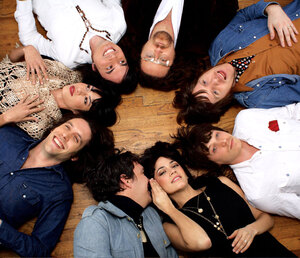Experimental eight-piece band enchants West Coast
What’s in the hype? Would a band with any less buzz sound as sweet?
You may have heard of them, but unless you’re a new music prowler, chances are you haven’t. Still, the Phenomenal Handclap Band offers a unique sound worth checking out, no matter what kind of tunes you’re into.

Show of hands · The Phenomenal Handclap Band, which hails from New York City, is composed of eight close-knit musicians. These nightlife veterans are playing the Dim Mak Party at Cinespace tonight, 8 p.m. - Photo courtesy of Big Hassle
“You know when they take a mango and put lime juice on it and dip it in chili powder?” posed the group’s frontman, Daniel Collás. “We would taste like that.”
Why?
“It’s pretty self-explanatory,” Collás said.
For those lacking in their synesthesia skills, the PHB is an eight-person band hailing from lower Manhattan and Brooklyn, and they sound like everything from Pink Floyd to Santana, LCD Soundsystem to Stevie Wonder. Their self-titled LP is interesting and distinctive, filled with groovy tracks and funky rhythms.
Collás is one of the collective’s founders, along with Sean Marquand. Both were once DJs, and the formation of their current project can be accredited to their involvement in New York’s social scene.
“I’ve been involved in nightlife in this city for a long time,” Collás explained. “In addition to DJing, I was promoting parties, and when you’re doing those things you’re out a lot and meet a lot of people.”
Another benefit of being a DJ? Test drives.
“You can play your own stuff out and see peoples’ reactions,” he said. “You have a forum.”
Testing the waters fared well for The Phenomenal Handclap Band. Though many tweaks were made before the record was released to the public, the version you’ll hear today is interesting and enthralling dance rock that could bump at a club or in a pair of headphones just the same.
“We thought about playing it live and making the best record possible,” Collás said of their debut.
Keeping performance in mind proved to be a good decision for the band now well known for its live shows.
The group brings energy when it takes the stage, as any eight-piece band likely would. Its concerts have received a fair amount of press in the Big Apple, which Collás seems to think has something to do with the collective’s underlying sense of community — because the eight of them are so close-knit, it’s like you’re watching a family instead of an array of children from the New York club scene.
“The thing we choose to do more than anything is spend time together,” Collás said. “Even if we’re just hanging out, it’s familiar, as in like a family.”
The result of such band unity is a surprisingly effortless sound that fills a necessary void in today’s music scene, specifically a spot you didn’t know you were missing.
While the band’s sound has been criticized for feeling too “big,” the result of this is a psychedelic feel hard to come by these days. It sounds like a bunch of kids dropped some acid and spiked some dance tunes with rock, funk and whatever else they’d been listening to that month. Opting to leave the assumption up to the listener, Collás will neither confirm nor deny that the band members were under the influence of LSD during the making of their record.
“Anyone who has taken acid and tried to make music, I’m sure while you’re playing it, it sounds cool,” he said. “But regardless, there is usually an engineer or someone in the studio who’s not that high saying, ‘Uh, guys?’ The sound of people on drugs making music is sometimes just not that interesting.”
If anyone knows what makes music interesting, it is Collás and his collective. Their album keeps listeners guessing with everything from obscure influences to surprise guest stars. The addition of blues legend Jon Spencer to “Give It A Rest” makes the track groovy and fun, similar to something Sly & The Family Stone would have dropped when they were feeling annoyed (in a good way, a way that requires cowbell). “Testimony” is catchy in just the right way, featuring hot guitar riffs as well as TV on the Radio’s Jaleel Bunton.
If you listen to the rest of the album in its entirety, you’ll most likely be pleasantly surprised — if not by the sound, then by the fact that music like this is actually being made.
As you lay back and absorb one of our generation’s coolest new experiments, one question will undoubtedly cross your mind: “Why are they called ‘The Phenomenal Handclap Band?’ Where are all the handclaps? It doesn’t make sense.”
Collás has an answer to that.
“The whole reason I got into this business was to put handclaps on records,” he explained. “But people got restless with the idea of using human hands, so we started to use these sort of computerized hands because clapping is the best form of appreciation there is.”
Whether the band’s listeners are at one of the group’s renowned live shows or in their rooms alone, one thing is for sure: innovation that sounds this good deserves a round of applause.
